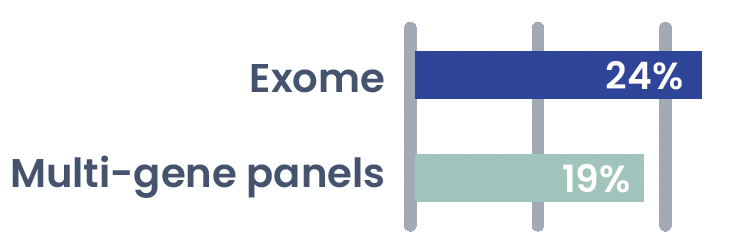Take a guideline-driven approach. Start with exome.

Exome is recommended as a first-line test for individuals with unexplained epilepsy by the National Society of Genetic Counselors and endorsed by the American Epilepsy Society.2

For patients with epilepsy, the diagnostic rate is significantly higher with exome than it is with multigene panels.3
57% of seizure-related genes are not included on many commercially available epilepsy panels.3

In a study of 22,616 individuals with seizures:3
75% of patients had genetic testing prior to exome, suggesting that previous tests did not resolve all clinical questions.
36% of patients with diagnostic findings via exome had variants in genes not included on epilepsy panels.
*Fictionalized case study for illustrative purposes only
References